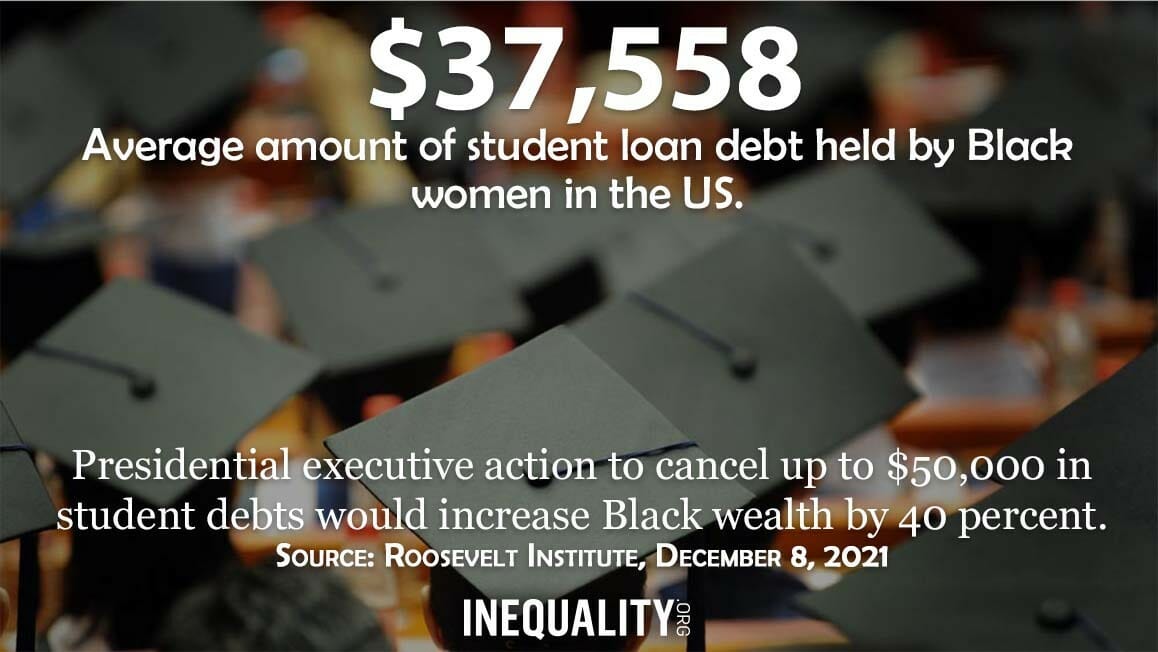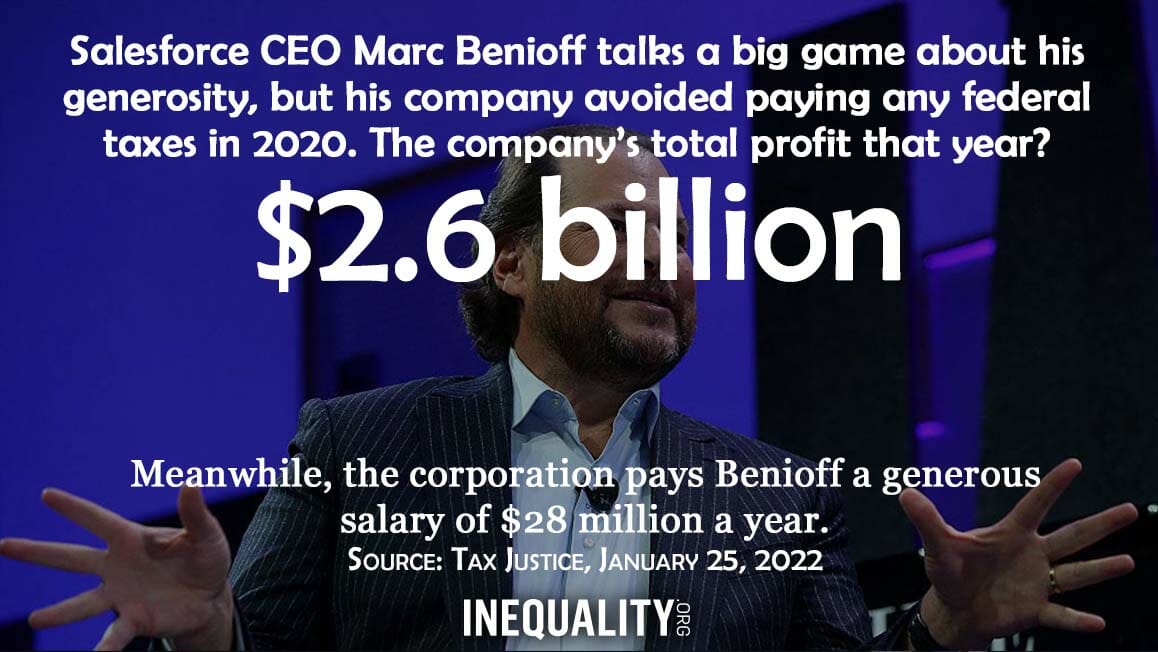| THIS WEEK |
One of the billionaires we’re highlighting this week, Salesforce CEO Marc Benioff, recently received a flashy write-up in the New York Times. In it, Benioff extolled the virtues of his fellow CEOs. During the pandemic, he proclaimed, chief execs proved “in many, many cases all over the world” to be the “heroes.”
“They’re the ones,” Benioff enthused, “who stepped forward with their financial resources, their corporate resources, their employees, their factories, and pivoted rapidly — not for profit, but to save the world.”
We, of course, know that claim to be patently untrue. We find nothing heroic about big-time CEOs and their fellow ultra-wealthy personally reaping over $2.1 trillion over the course of a global pandemic.
The real heroes throughout this pandemic? Those on the frontlines who lack the privilege to work from the safety of their homes. Each day they show up to work — at sites that range from hospitals and schools to warehouses and restaurants — to keep us afloat. We owe it to them to fight for a country that works for everyone. More on that fight in today’s issue.
Chuck Collins and Rebekah Entralgo,
for the Institute for Policy Studies Inequality.org team
|
|
| |
|
| INEQUALITY BY THE NUMBERS |
 |
|
|
|
| |
|
| FACES ON THE FRONTLINES |
 |
| Why Extending the Child Tax Credit Matters |
| Last month, millions of families with children stopped receiving the $300 monthly payments they were getting through the enhanced child tax credit in the Covid relief package enacted last March. With one key Democrat, Senator Joe Manchin, opposing this benefit’s restoration, negotiations over extending the credit via President Biden’s Build Back Better agenda have stalled. Manchin has expressed concerns over the Build Back Better price tag. But the legislation’s tax hikes on the rich fully pay for its agenda. Meanwhile, parents like Clara Moore, who uses her experiences in poverty as an advocate with the RESULTS Educational Fund, are hurting. The enhanced monthly credit in place last year allowed Moore to pay for child care for her daughter and avoid living paycheck-to-paycheck. We have more on Moore and the importance of benefits like the Child Tax Credit. |
|
| |
|
| WORDS OF WISDOM |
 |
|
|
|
| |
|
PETULANT PLUTOCRAT
OF THE WEEK |
 |
| A Billionaire with Contempt for Workers Baked In |
| Having “Rich” for a name doesn’t make you rich. But squeezing workers, billionaire Robert Rich Jr. has learned, will do the trick quite nicely. Rich runs a privately held firm, Rich Products, that makes private-label bakery products for big food chains. At the Rich Jon Donaire Desserts plant in Southern California, the mostly Latina women on the ice cream cake assembly line can make only $1 over the state minimum wage after ten years on the job. On November 3, workers at the plant went on strike, demanding a $3 raise over three years. Rich’s local plant managers see their company’s current pay rates as already “competitive” — and offered only desultory 50- and 55-cent hikes. A $1 hourly raise, the workers’ union points out, would cost billionaire Rich just “$165,000 a year.” Local elected officials, meanwhile, have begun taking up the striker cause. The Rich corporate response? An email rant to the L.A. County Board of Supervisors asserting that elected officials should not be “taking a side.” |
|
| |
|
| BOLD SOLUTIONS |
 |
| Boost Public Transit to Close Inequality Gaps |
For decades, the federal government has spent about four times as much on roads as on public transit, a policy choice that has accelerated climate change and widened racial and economic inequalities. Low-income households and people of color have always been less likely than other Americans to own cars. When they do, the related costs suck up a much larger share of their family budgets. The poorest 10 percent of U.S. households spend 23 percent of their after-tax income on vehicle costs. The richest 10 percent spend just 3 percent.
Through a series of data-based charts, a new report from Institute for Policy Studies climate policy director Basav Sen is making the case for investing in public transit to reduce inequality. Sen is also organizing for Transit Equity Day, a national annual event on Rosa Parks’s February 4 birthday that has transit rider, labor, civil rights, and environmental justice groups lifting up demands for affordable, accessible public transit for all, powered by electricity from renewable sources and good union jobs. |
|
| |
|
| GREED AT A GLANCE |
 |
|
|
|
| |
|
| TOO MUCH |
 |
| Government Contracts: An Equality Battleground? |
| No entity in the entire world buys more goods and services than the federal government in the United States. Much of that buying has come from corporations that pay their top execs astoundingly more than they pay their workers. Federal procurement has, in effect, left America’s rich significantly richer. But government contracting, if managed with greater equity in mind, could have the exact opposite impact. Inequality.org co-editor Sam Pizzigati has more. |
|
|
|
| |
|
| MUST READS |
This week on Inequality.org
Chuck Collins, Report: Taxing the World’s Richest Would Raise US $2.52 Trillion a Year. A new joint report from Fight Inequality Alliance, Institute for Policy Studies, Oxfam, and Patriotic Millionaires details what can be funded by simply taxing the rich.
Elsewhere on the Web
Alan Golds, The billion-dollar question: Can you be TOO rich? CBS News. A look at Ingrid Robeyns, a philosopher promoting a concept called limitarianism, and more reactions to new Institute for Policy Studies data on wealth concentration.
Faiza Shaheen, Solutions to inequality, Pathfinders. From a noted UK economist, the introduction to what promises to be a fascinating series on inspiring policy ideas and initiatives that challenge inequality around the world.
Steve Wamhoff and Joe Hughes, Revenue-Raising Proposals in the Evolving Build Back Better Debate, Institute on Taxation and Economic Policy. The revenue-raising proposals that have been considered as part of the Build Back Better debate represent a dramatic departure from the tax policies enacted by Congress over the past 20 years, most of which have benefited America’s best-off.
Hamilton Nolan, The Billionaire Side Hustle That Inequality Created, In These Times. Our rich today can essentially print themselves money simply by buying rare luxury assets coveted by other ultra-rich and flipping them.
Hanna Szymborska and Jan Toporowski, How Inequality Leads to Industrial Feudalism, Institute for New Economic Thinking. In societies where asset ownership concentrates, social mobility severely diminishes.
Guido Alfani, Victoria Gierok, and Felix Schaff, Economic inequality in Germany: A long-run view, VoxEU. New evidence is transforming how we look at long-term trends in economic inequality.
Kate Wagner, Suburban Chicago McMansions Follow a Dark Logic Even I Do Not Understand, McMansion Hell. Owners of the McMansions in the Chicago suburbs seem to be in a competition to build the most outrageous collage of wealth signifiers imaginable. |
|
| |
|
| A FINAL FIGURE |
 |
|
|
|
| |
|
| BE THE 1% (NO, NOT THAT 1%) |
 |
Our goal for 2022: that 1% of our Inequality.org subscribers become monthly sustainers and help grow our newsletter and research efforts. Be the 1%, for as little as $3 a month! |
|
|
|
| |
|
|